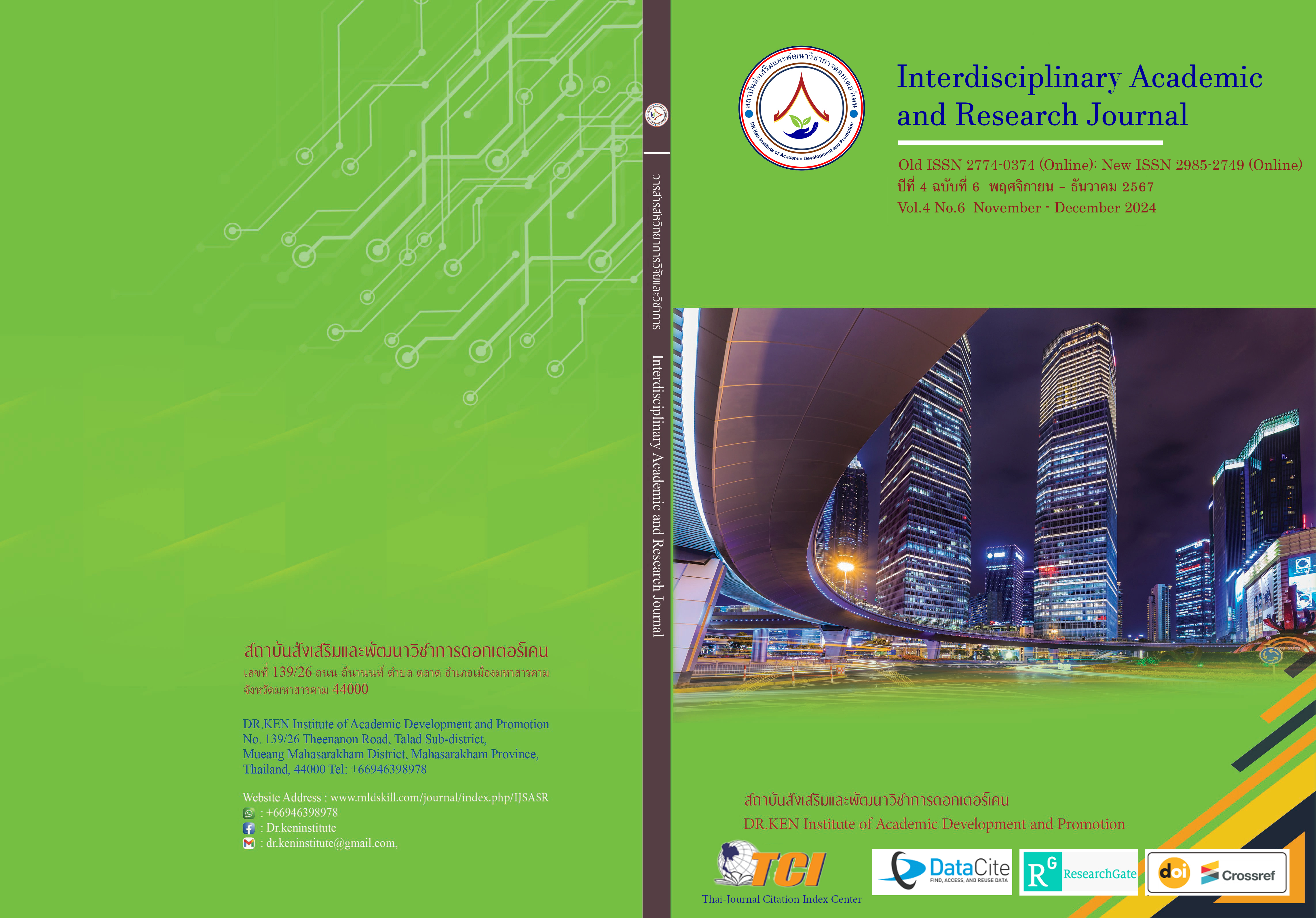Synthesizing Knowledge about Organizational Politics in the Study of Organizational Behavior
DOI:
https://doi.org/10.60027/iarj.2024.277816Keywords:
Organizational Politics, Organizational Behavior, Knowledge SynthesisAbstract
Background and Aims: In public administration, organizational behavior is studied. There is one important issue which is politics in the organization. This research aims to survey and synthesize knowledge about organizational politics in organizational behavior books from 2007 - 2023.
Methodology: This research is qualitative research. It is a document research. The study was conducted according to the process of textbook research. Content analysis was used to analyze the data.
Results: The research results found that there were 22 books with topics about organizational politics. Almost every book, especially in the last 7 years, had topics about politics in organizations. This reflects the importance of studying organizational politics in organizational behavior studies. From the survey, it was possible to synthesize knowledge into 13 issues: the nature of organizations that cause organizational politics, the definition of organizational politics, issues related to organizational politics, the level of organizational politics, factors or causes that cause organizational politics, types of organizational politics and ethical criteria for political expression in organizations, strategies for using politics in organizations, political skills in organizations, results of organizational politics, suggestions in adjusting to organizational politics at the individual level, suggestions for managing organizational politics at the organizational level, and the benefits of studying organizational politics.
Conclusion: Almost every book on organizational behavior has a topic about organizational politics, especially in the last seven years, which reflects the importance of studying organizational politics in the study of organizational behavior. Both consistent and different knowledge are presented. This research is synthesized into various issues to cover and complement each other. In addition, it will be found that most of the content or examples are general and do not focus on organizations in any specific sector. Therefore, for the benefit of developing knowledge about organizational politics for public administration studies, there should be more focus on the context of public administration.
References
กระทรวงศึกษาธิการ. (2558). ประกาศกระทรวงศึกษาธิการ เรื่อง มาตรฐานคุณวุฒิระดับปริญญาตรี สาขาวิชารัฐประศาสนศาสตร์ พ.ศ. 2558. Retrieved on March 10, 2023 from: http://www.mua.go.th/users/tqf-hed/news/news6.php
กัลยารัตน์ ธีระธนชัยกุล. (2562). พฤติกรรมองค์การและการพัฒนาองค์การ. กรุงเทพฯ: ซีเอ็ดยูเคชั่น.
จุลศักดิ์ ชาญณรงค์. (2559). การศึกษาพฤติกรรมองค์การยุคดั้งเดิม ยุคใหม่ และยุคที่ใหม่กว่า. มนุษยศาสตร์ สังคมศาสตร์, 33(1) : 46-62.
เจษฎา นกน้อย. (2560). พฤติกรรมองค์การ. กรุงเทพฯ : สำนักพิมพ์แห่งจุฬาลงกรณ์มหาวิทยาลัย
เดชา เดชะวัฒนไพศาล. (2565). พฤติกรรมองค์การ : ทฤษฎีและการประยุกต์. กรุงเทพฯ : สำนักพิมพ์จุฬาลงกรณ์มหาวิทยาลัย.
ธนวรรธ ตั้งสินทรัพย์ศิริ. (2550). พฤติกรรมองค์การ. กรุงเทพฯ : ธนธัชการพิมพ์.
ธีรพล ทิพย์พยอม. (2564). การทบทวนวรรณกรรมอย่างเป็นระบบขั้นพื้นฐานสำหรับบุคลากรทางการแพทย์. กรุงเทพฯ : สำนักพิมพ์จุฬาลงกรณ์มหาวิทยาลัย.
พรชัย ลิขิตธรรมโรจน์. (2558). พฤติกรรมองค์การ. พิมพ์ครั้งที่ 4. สงขลา : ภาควิชารัฐประศาสนศาสตร์ คณะวิทยาการจัดการ มหาวิทยาลัยสงขลานครินทร์.
พรพรหม ชมงาม. (2551). พฤติกรรมและการสื่อสารในองค์การ. กรุงเทพฯ : มหาวิทยาลัยกรุงเทพ.
พฤทธิพงศ์ จักกะพาก. (2564). การพัฒนาทุนมนุษย์ตามแนวทางรัฐประศาสนศาสตร์. วารสาร มจร สังคมศาสตร์ปริทรรศน์ , 10 (2), 354-363.
พิบูล ทีปะปาล. (2550). พฤติกรรมองค์การสมัยใหม่. พิมพ์ครั้งที่ 5. กรุงเทพฯ : อมรการพิมพ์.
ภาวิณี เพชรสว่าง. (2552). พฤติกรรมองค์การ. กรุงเทพฯ : วิรัตน์ เอ็ดดูเคชั่น.
ภูริพัฒน์ ชาญกิจ. (2562). พฤติกรรมระดับบุคคล. ใน สาขาวิชาศิลปศาสตร์ มหาวิทยาลัยสุโขทัยธรรมาธิราช (บรรณาธิการ), เอกสารการสอนชุดวิชาพฤติกรรมองค์การและการจัดการการตลาด หน่วยที่ 1-7 ฉบับปรับปรุงครั้งที่ 2, (น. 2-1 – 2-53). นนทบุรี : สำนักพิมพ์มหาวิทยาลัยสุโขทัยธรรมาธิราช.
รังสรรค์ ประเสริฐศรี. (2556). พฤติกรรมองค์การ. นนทบุรี : กรีนแอปเปิ้ล กราฟฟิค พริ้นติ้ง.
รังสรรค์ ประเสริฐศรี. (2559). อำนาจและการเมืองในองค์การ. ใน สาขาวิชาวิทยาการจัดการ มหาวิทยาลัยสุโขทัยธรรมาธิราช (บรรณาธิการ), เอกสารการสอนชุดวิชาพฤติกรรมมนุษย์ในองค์การ หน่วยที่ 8-15 ฉบับปรับปรุงครั้งที่ 1, (น. 13-1 – 13-40). นนทบุรี : สำนักพิมพ์มหาวิทยาลัยสุโขทัยธรรมาธิราช.
ลักษณา ศิริวรรณ. (2561). การสังเคราะห์ความรู้ด้านการจัดการเชิงกลยุทธ์ในภาครัฐ. วารสารพัฒนบริหารศาสตร์, 58 (2), 46-77.
วันชัย มีชาติ. (2551). พฤติกรรมการบริหารองค์การสาธารณะ. กรุงเทพฯ : สำนักพิมพ์แห่งจุฬาลงกรณ์มหาวิทยาลัย.
วิภาส ทองสุทธิ์. (2557). พฤติกรรมองค์การ. พิมพ์ครั้งที่ 2. กรุงเทพฯ : อินทภาษ.
ศิริวรรณ เสรีรัตน์, สมชาย หิรัญกิตติ หิรัญกิตติ และธนวรรณ ตั้งสินทรัพย์ศิริ. (2550). การจัดการและพฤติกรรมองค์การ. กรุงเทพฯ : Diamond in business world.
สมชาย หิรัญกิตติ. (2560). พฤติกรรมองค์การ. กรุงเทพฯ : ธรรมสาร.
สมศักดิ์ กิจธนวัฒน์. (2550). พฤติกรรมองค์การ. อุดรธานี : คณะวิทยาการจัดการ มหาวิทยาลัยราชภัฏอุดรธานี.
สร้อยตระกูล (ติวยานนท์) อรรถมานะ. (2553). พฤติกรรมองค์การ: ทฤษฎีและการประยุกต์. พิมพ์ครั้งที่ 4. กรุงเทพฯ : สำนักพิมพ์มหาวิทยาลัยธรรมศาสตร์.
สัญญา เคณาภูมิ. (2562). หลักการและแนวทางการสังเคราะห์งานวิชาการ. วารสารการบริหารการปกครองและนวัตกรรมท้องถิ่น. 3(2), 89-106.
สุกานดา นาคะปักษิณ. (2560). พฤติกรรมองค์การ. ขอนแก่น : คณะบริหารธุรกิจและการบัญชี มหาวิทยาลัยขอนแก่น.
สุธรรม รัตนโชติ. (2552). พฤติกรรมองค์การและการจัดการ. กรุงเทพฯ : ท้อป
สุพานี สฤษฎ์วานิช. (2552). พฤติกรรมองค์การสมัยใหม่: แนวคิด และทฤษฎี. พิมพ์ครั้งที่ 2. กรุงเทพฯ : คณะพาณิชยศาสตร์และการบัญชี มหาวิทยาลัยธรรมศาสตร์.
อรอนงค์ สวัสดิ์บุรี. (2555). พฤติกรรมและการสื่อสารในองค์การ. กรุงเทพฯ : สำนักพิมพ์แห่งจุฬาลงกรณ์มหาวิทยาลัย.
อรุณ รักธรรม และปีเตอร์ รักธรรม. (2560). พฤติกรรมการบริหารองค์การ. กรุงเทพฯ : โรงพิมพ์มหาวิทยาลัยธรรมศาสตร์.
อุไรวรรณ วรกุลรังสรรค์. (2558). การสังเคราะห์งานวิจัยในสาขาบรรณารักษศาสตร์และสารสนเทศศาสตร์. วิจัยสมาคมห้องสมุด. 8(2), 20-34.
Behnke, Y. (2018). Textbook Effects and Efficacy. In The Palgrave Handbook of Textbook Studies (pp. 383-398). New York : Palgrave Macmillan.
Bowen, G. (2009). Document Analysis as a Qualitative Research Method. Qualitative Research Journal. 9(2), 27-40.
Jamaramarn, U., & Thanaratchataphoom, T. (2003). Synthesis of Research Related to Selection of Candidates to Study in Higher Education Institutions. Journal of Education, Prince of Songkhla University, Pattani Campus. 15(2), 35-45.
Morgan, K & Henning, E. (2013). Designing a Tool for History Textbook Analysis. Forum: Qualitative Social Research. 14(1), 1-21.
Nicholls, J. (2003). Methods in School Textbook Research. International Journal of Historical Learning, Teaching and Research. 3(2), 11-26.
O’Keeffe, L. (2013). A Framework for Textbook Analysis. International Review of Contemporary Learning Research. 2(1), 1–13.
Pingel, F. (2010). UNESCO Guidebook on Textbook Research and Textbook Revision. Paris: George Eckert Institute/UNESCO.
Pudas, A. K. (2013). Investigating Possibilities to Develop Textbooks to Implement Global Education in Basic Education Instruction. IARTEM e-Journal. 5(2), 1-22.
Roberts, S. L. (2014). A Review of Social Studies Textbook Content Analyses Since 2002. Social Studies Research & Practice. 9(3), 51-65.
Wade, R. C. (1993). Content Analysis of Social Studies Textbooks: A Review of Ten Years of Research. Theory & Research in Social Education. 21(3), 232-256.
Wang, H. (1998). Science Textbook Studies Reanalysis: Teachers “Friendly" Content Analysis Methods? Annual Meeting of the National Association for Research in Science Teaching, 19-22 April 1998, San Diego.
Downloads
Published
How to Cite
Issue
Section
License
Copyright (c) 2024 Interdisciplinary Academic and Research Journal

This work is licensed under a Creative Commons Attribution-NonCommercial-NoDerivatives 4.0 International License.
Copyright on any article in the Interdisciplinary Academic and Research Journal is retained by the author(s) under the under the Creative Commons Attribution-NonCommercial-NoDerivatives 4.0 International License. Permission to use text, content, images, etc. of publication. Any user to read, download, copy, distribute, print, search, or link to the full texts of articles, crawl them for indexing, pass them as data to software, or use them for any other lawful purpose. But do not use it for commercial use or with the intent to benefit any business.
















.png)


